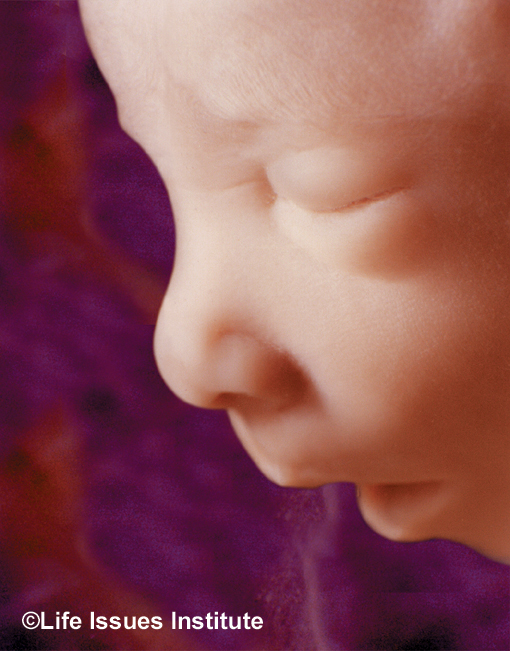The Constitution and Personhood Jurisprudence
Does the U.S. Constitution and the history of American jurisprudence support the personhood movement?
Introduction
American Right To Life asserts that crime, actual crime, is not determined by cultural idiosyncrasies, conventions, or agreements between human beings, but that actual criminal behavior involves actions that violate certain eternal moral precepts, regardless of the particulars of any nation's constitution. Thus the leader of an Islamic nation who executes a man for becoming a Christian is guilty of murder, truly, and judged that way by history and by God, regardless of anything his own state's constitution may assert.
As Martin Luther King Jr. wrote in his Letter from a Birmingham Jail, quoting St. Augustine, "An unjust law is no law at all." For right and wrong (regarding theft, kidnapping, perjury, intentionally killing innocent people, etc.) do not come into existence with the passing of a law or the ratification of any nation's constitution. Rather, these behaviors describe actions that are inherently criminal because they violate fundamental human rights.
Where Do Rights Come From?
Human rights do not come from the government, for then they wouldn’t be rights; nor from the majority (consider America and slaves, Turkey and Armenians, Germany and Jews); nor from the delivery doctor or hospital at birth. For rights come from our Creator, possessed therefore at the moment that we are created. Jeremiah 1:5 quotes God saying, “Before I formed you in the womb I knew you.” The Declaration of Independence affirms what those who believe in God have always known. “We hold these truths to be self-evident, that all men are created equal, that they are endowed by their Creator with certain unalienable Rights, that among these are Life…” Just as the right to life is seen in the Ten Commandments, Do not murder, so too the right to own property requires the command, Do not steal, and the right to due process undergirds the command, Do not bear false witness (perjury). We have human rights because we are made in our Creator’s image and likeness, which is why parents, unlike animals, have a moral obligation to protect and love our children, born and unborn.
 Preamble of the U.S. Constitution - Posterity
Preamble of the U.S. Constitution - Posterity
Regarding the securing of rights to ourselves and our "posterity," this word means both the future generations of all of us collectively, and also the descendants and offspring of each of us as individuals. And since our descendants consist only of one or more individual persons, protection of the rights of our posterity has meaning only if it provides for the protection of the rights of those persons as individuals, including then each of our unborn offspring.
U.S. Constitution, "Corruption of Blood," and Punishing Children
Regarding abortion ban "exceptions" for rape and incest, the Bible teaches, "nor shall the children be put to death for their fathers." (See AmericanRTL.org/Bible.) Even the U.S. Constitution recognizes the inherent immorality of punishing a child for the crime of the father. For example, by the invalid legal doctrine of "corruption of blood," the child of a man convicted of an egregious crime could not inherit from a paternal grandfather because the inheritance theoretically passed through the convicted father. So, consistent with the Scriptural prohibition of punishing a child for the crime of his father, Article III, Section 3 of the Constitution prohibits "corruption of blood" laws.
Citizens Naturalized or Born
"Section 1. All persons born or naturalized in the United States, and subject to the jurisdiction thereof, are citizens of the United States..." This beginning of the 14th Amendment prevents an illegal alien, for example, from automatically getting citizenship merely because he is here. Of course this does not mean that states can kill, or permit the wanton killing of, those who are not citizens. This is not about inalienable rights but only about conferring citizenship. Thus the "born or naturalized" clause prevents those not born here, such as illegal aliens or foreign tourists, from obtaining citizenship without being naturalized. It is a grotesque non-sequitur to claim that the Constitution thereby does not require "equal protection" for everyone within the jurisdiction of the states. This Section 1 goes on to demand just that (see below), including of course for all non-citizens such as foreign tourists. How absurd if other countries denied American travelers protection under their murder statutes, because we were merely non-citizen tourists. Longtime AUL general counsel Paul Linton, as a lawyer opposed to personhood strategy, actually makes that abortionist-sounding, egregiously immoral, and unconstitutional argument that if any person is not "born" here, then the federal government must not enforce the 14th amendment requirement that the States provide "due process" and "equal protection" to such persons.
5th Amendment Protection
"No person shall be... deprived of life, liberty, or property, without due process of law; nor shall private property be taken for public use, without just compensation." Life is the paramount human right because without it, a man can exercise no other right.
14th Amendment Protection
"Section 1. No State shall make or enforce any law which shall abridge the privileges or immunities of citizens of the United States; nor shall any State deprive any person of life, liberty, or property, without due process of law; nor deny to any person within its jurisdiction the equal protection of the laws."
Pregnancy, Personhood, and the Death Penalty
Various cultures through history recognized the value of the unborn child.
Ancient Greece, Persia, and the Hebrews: Providing some historical context for U.S. law, the Mosaic Law in the Bible's book of Exodus provides for a fine if a criminal causes a premature birth but requires the death penalty if the unborn child is killed. A thousand years later, Hippocrates, in 5th-century BC Greece wrote in his oath, "never do harm" and "I will not... cause an abortion" as taught also by the school of Pythagoras. Ancient Persia acknowledged that the fetus is a person, regardless of the circumstances of his conception. Persians likewise recognized the intentional killing of an unborn child as murder and accordingly punished any guilty parties including the mother and the abortionist. (For example, search the Vendidâd for "abortion".) At Pub Med a peer-reviewed 2013 paper reports that the, "...ancient Persians valued the foetus as a living person equal to others. Accordingly, they brought laws against abortion, even in cases of sexual abuse. Furthermore, abortion was considered to be a murder and punishments were meted out to the mother, father, and the person performing it." In the Middle Ages Europe began to throw off pagan Roman influence at in the 1100s began to criminalize abortion. More recently, as published by Human Life Alliance in his Preborn Children, the Law, and Personhood 1 attorney Gregory Roden demonstrates that in addition to the U.S. Supreme Court recognizing the unborn child's inheritance rights in 1884 and 1972 cases, America's legal tradition and its Supreme Court had always recognized the fetus' right to life whenever the topic arose regarding the execution of a convicted pregnant woman.
History of Inheritance in the US: The U.S. Supreme Court in 1884 McArthur v. Scott ruled in favor of "The plaintiffs in the present case, being as yet unborn," regarding "the will of their grandfather..." Similarly, in their 1972 Weber v. Aetna Casualty & Surety Co. case, in which the youngest "child was born posthumously," that is after the father's death, the court ruled that the case "requires equality of treatment between two classes of persons," in this case, between legitimate and illegitimate offspring, and for both born and unborn, as late as a year before Roe, the court recognized the inheritance rights of the unborn child.
History of Execution in the US: of a pregnant woman, consider a Massachusetts case and a U.S. Supreme Court case. A "plea of pregnancy" was recognized for example from the very first capital case in the United States, in which a woman and three men were executed. Sadly, with the early stages of pregnancy not well understood until much later (including through the Carnegie Stages of Early Human Development, and later through the ultrasound window to the womb), an execution would only be postponed if "quickening" of the child had been determined. And more sadly still, after conflicting and repeated testimony by many investigators as to whether the woman was pregnant, an autopsy proved that a five-month-old unborn child indeed had been killed in the hanging of his mother. Yet, as in the 1778 Massachusetts case, Commonwealth v. Bathsheba Spooner, the court supported the "plea of pregnancy." And more than a hundred years later, in 1891 the U.S. Supreme Court in Union Pacific Railway Co. v. Botsford, consistent with Scripture, positively observed that in common law, a woman convicted of a capital crime would be examined for pregnancy, "in order to guard against the taking of the life of an unborn child for the crime of the mother." This is right. For as demonstrated in AmericanRTL.org/Bible, God's Word is filled with teachings showing the personhood of the unborn child. And though generally speaking, as King Solomon wrote, punishment should be executed swiftly (Eccl. 8:11), the Bible condemns killing a child for the crimes of a parent (see Ezek. 18:20). As for example Deuteronomy 24:16 states, "Fathers shall not be put to death for their children, nor shall the children be put to death for their fathers; a person shall be put to death for his own sin." These same principles, both in Scripture and in America's legal history, also condemn the rape and incest "exceptions" practice of killing an unborn child because her father is a criminal. See also AmericanRTL.org/Bible.
"Life in Being" includes Gestation Period
The term "life in being" appears in the "rule against perpetuities" which is designed to prevent the deceased from controlling property indefinitely. Merriam-Webster defines rule against perpetuities as, "a common-law rule stating that in order for a future interest to be good it must vest... at the death of a testator... within a life in being or lives in being plus 21 years plus the period of gestation of any beneficiary conceived but not yet born." Wikipedia quotes Black's Law Dictionary, the 8th edition from 2004, regarding the vesting of an estate, "no later than 21 years (plus a period of gestation to cover a posthumous birth) after the death of some person alive when the interest was created."
So, as to which parts of the U.S. Constitution relate to protecting an unborn child, that question is mostly irrelevant because a baby is a baby in New Zealand, Iraq, the U.S., and everywhere, regardless of what a nation's law or constitution says or doesn't say.
Justice Neil Gorsuch Rejects Personhood
Neil Gorsuch, the Supreme Court justice nominated by president Donald Trump, should know all the above as a matter of routine. For his confirmation hearings, the two most important questions that he should have been asked (ones that "conservative" news outlets like Fox News would never utter) are the following:
- First, regarding the right to life, at what point Judge Gorsuch do we acquire that right to life?
- Secondly, when you’ve said that judges should ignore their personal values and instead follow the constitution and the law, Judge Gorsuch, what are the limits to that?
Tragically though, this is what transpired:
And there's this from kgov.com/republican-judicial-crisis about the one considered the front-runner on Donald's Trumps 2020 list 44 possible judicial nominees:
2017 Harvard Journal Personhood Paper
The prestigious Harvard University publication, Harvard Journal of Law and Public Policy, published an important paper by its editor Josh Craddock, Protecting Prenatal Persons: Does the Fourteenth Amendment Prohibit Abortion? ARTL highly recommends this paper.
- 1Roden, Gregory J.. “Unborn children as constitutional persons.” Issues in law & medicine 25 3 (2010): 185-273, https://www.semanticscholar.org/paper/Unborn-children-as-constitutional-persons.-Roden/3a762ae199811b3f2e7fb1570aab9830b1c94a9b

